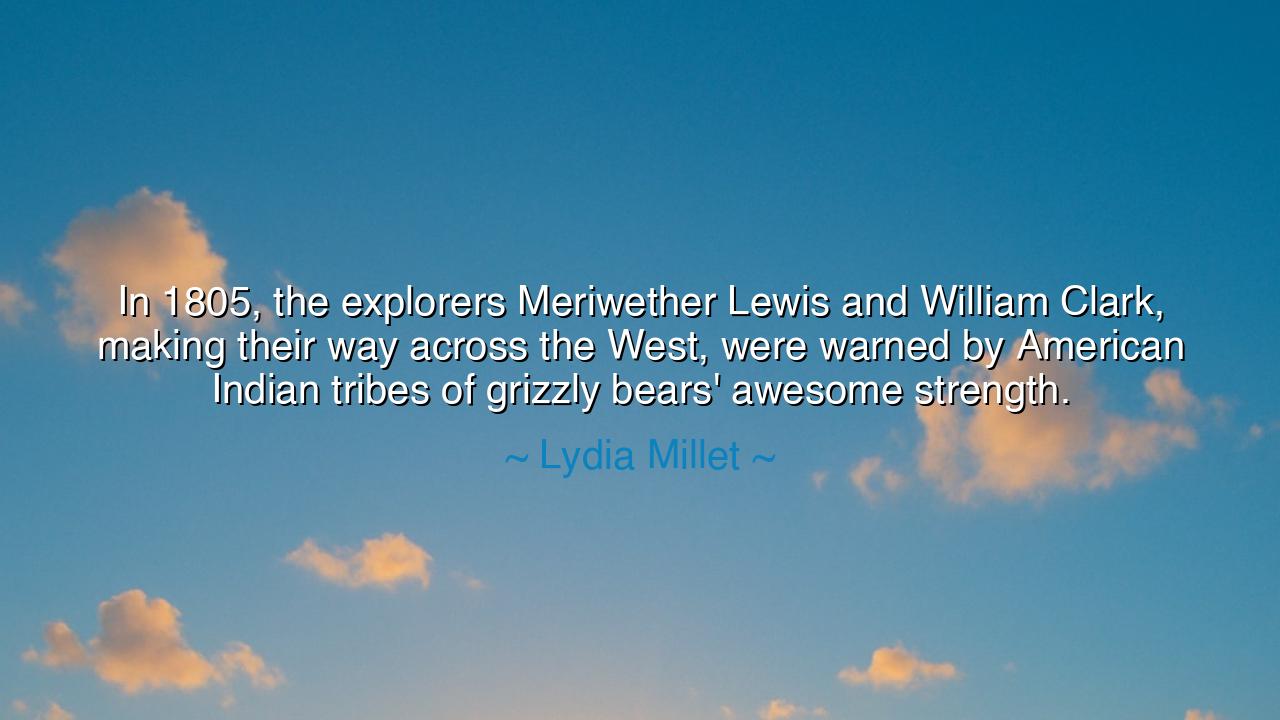
In 1805, the explorers Meriwether Lewis and William Clark
In 1805, the explorers Meriwether Lewis and William Clark, making their way across the West, were warned by American Indian tribes of grizzly bears' awesome strength.






In the words of Lydia Millet, “In 1805, the explorers Meriwether Lewis and William Clark, making their way across the West, were warned by American Indian tribes of grizzly bears’ awesome strength.” This line is not merely a remembrance of history, but a timeless parable. It speaks of the moment when men of ambition and discovery, carrying the banners of a new nation, encountered not only the vastness of untamed lands but also the ancient wisdom of those who had long walked them. For in the West, the grizzly bear was no mere beast; it was a symbol of power, endurance, and the wild majesty that humbles human pride.
The warning of the tribes was not born of superstition but of knowledge passed down through generations. The American Indians understood the balance between man and nature; they revered the strength of the grizzly not as an enemy to be conquered, but as a force to be respected. Lewis and Clark, representatives of a nation eager to expand, carried with them the fire of progress. Yet in that fire lay the danger of arrogance. The warning was a reminder: the land was older than they, the creatures mightier in their domain, and wisdom was found not in conquest alone, but in reverence for the forces that stood before them.
So too does this moment echo in the hearts of all who venture into unknown territory. Whenever we step into the uncharted—be it new lands, new knowledge, or new endeavors—there will always be the grizzly bears of life, the challenges whose strength exceeds our expectation. And like the explorers of old, we are often warned by those who came before us. The question is whether we heed the wisdom or rush ahead blinded by our own sense of invincibility.
Consider the tale of Napoleon in Russia. Warned of the harsh winter and the unforgiving expanse, he pressed forward, believing sheer will and discipline would conquer all. But nature, like the grizzly, cared nothing for human ambition. The cold, relentless and merciless, broke his army as surely as the claws of the great bear would rend flesh. Here again, the lesson was written: heed the warnings of those who know the land, or perish beneath the weight of your own pride.
Yet let us not mistake this teaching as one of fear, but of balance. The grizzly does not forbid passage—it demands respect. Likewise, life’s challenges are not to drive us into hiding, but to awaken us to our smallness and to sharpen our preparation. Lewis and Clark, though warned, faced the grizzlies with courage and learned firsthand the truth of their strength. In this, they became wiser, their journey tempered not only by victories of discovery but by the scars of hard lessons.
The wisdom, then, is this: when you embark on your journey, listen to the voices of experience. The elders, the mentors, the ones who have walked the path before—these are your tribes who warn you of the bears ahead. Do not mistake their caution for weakness; it is a gift, meant to preserve your strength for the battles that must be fought.
Practically, this means we must seek counsel before great undertakings. Learn from the stories of those who failed, and prepare with humility. Approach your “grizzlies” not with reckless pride, but with courage joined to wisdom. Strength alone cannot save you; it is wisdom that guides the hand, and respect that keeps the heart from destruction.
Thus, let Lydia Millet’s words echo as an ancient teaching: in every wilderness there is a grizzly bear, and in every bear a lesson. Respect the strength of what you do not yet understand, honor the warnings given to you, and walk forward with both humility and resolve. In this balance lies not only survival, but greatness.






AAdministratorAdministrator
Welcome, honored guests. Please leave a comment, we will respond soon